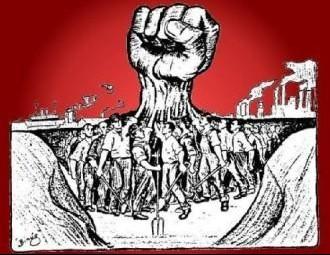Aliaksandr Jarashuk: We surely don’t need a war within the democratic community

Who saved Belarusan independent trade unions from their final defeat? What country can Belarus have as an example? How can we try to protect trade union activists from repressions?
It was the topic for the conversation between EuroBelarus and Aliaksandr Jarashuk, the head of Belarusan Congress of Democratic Trade Unions (BCDTU).
On the pressure independent trade unions feel:
- Public laws function similar to the laws of physics: the more pressure we put, the more united and able to function the organization becomes. Of course, it would be ridiculous for me to say that this is what we want in trade union; but we are aware that neither this pressure nor the policy of the authorities depend on us.
Of course, we are worried about the repressions, which are only worsening. The reason for that is clear: we are dealing with the most sensible issues, and the authorities consider it to be a risk under such tough social and economic situation.
On the other hand, the existing pressure is not only a challenge; it also provides us with possibilities. And this is why the trust in independent trade unions is growing. And the most important point is that the trust grows, though not everyone knows about our organization. The conclusion we can draw from it is that due to difficult social and economic situation some changes are happening, and certain prospective for the institution of trade union opens.
On the new policy:
- Because of the pressure we change our policy, which from now on is going to consist in securing people from similar repressions by means of associate membership of independent trade unions, so that people pay their subscriptions not through the enterprise’s accounting, as in such case they are subject to momentary repressions.
Of course, it is a forced decision, and we wouldn’t like to formalize the relations with our members and supporters; however, we shouldn’t be that thoughtless and expose people to tough repressions. That is why we change the tactics, and we have more difficult, but all the more interesting time to come. We accept the challenge set by the authorities, and we do believe we are equipped enough to withstand this pressure and even win this battle.
On the influence of International Labor Organization in Belarus:
- I still think that position of International Labor Organization (ILO) and the decisions it had made played certain role and influenced the stance of our organization now. I proceed from the assumption that ILO’s policy has mostly been sensible, and its special value lies in its principle stand combined with flexibility, which leaves opportunities for open dialog.
Still, we have to admit, that in current social and economic situation Belarusan regime will rather prefer to remove possible problems it can get if independent trade unions will restore its rights than fear possible sanctions for non-compliance with the ILO’s recommendations.
On following Myanmar:
Indeed, Belarusan regime is somewhat repeating the road of Myanmar, another international outcast, which lost EU trade preferences as well as Belarus. Belarus was second on this list; and for now, these two cases are unique.
Belarusan regime is very persistent in its attempts to make ILO impose economic sanctions against it. And as far as we know that Belarusan authorities demonstrate exceptional diligence in the conflicts with the international community, I can’t exclude such possibility. However, ILO still has considerable lever of influence on Belarusan authorities, but let’s see how the story is going to develop in future, shall we.
On comparing Belarusan Congress of Democratic Trade Unions (BCDTU) with Polish “Solidarity”:
Polish experience is unique in that “Solidarity was more social and political movement than a trade union one. We know that at that time no political parties or some other opposition forces could exist in Poland; and that is why those 10 million people, who entered “Solidarity”, pursued political goals.
In order to make BCDTU function similarly we need to at least sweep opposition political field, which would be absolute insanity in our situation. Because we surely don’t need a war within the democratic community.
I believe that not only it is harmful, but also is a crime. If the policy of the whole democratic community and opposition forces in Belarus is developed correctly, there will be place for everyone and everyone will act in the legal framework and even can produce synergetic effect.
Belarusan authorities want to see atomization of society; it is their primarily goal. That is why even the most peaceful organizations represent a challenge and a danger for them. So if we develop our common strategy and are less messed up in conflicts between opposition, we can indeed create a considerable potential for changes. And it is possible that BCDTU will play an important, if not a crucial, role there.
-
03.01
-
07.10
-
22.09
-
17.08
-
12.08
-
30.09








































